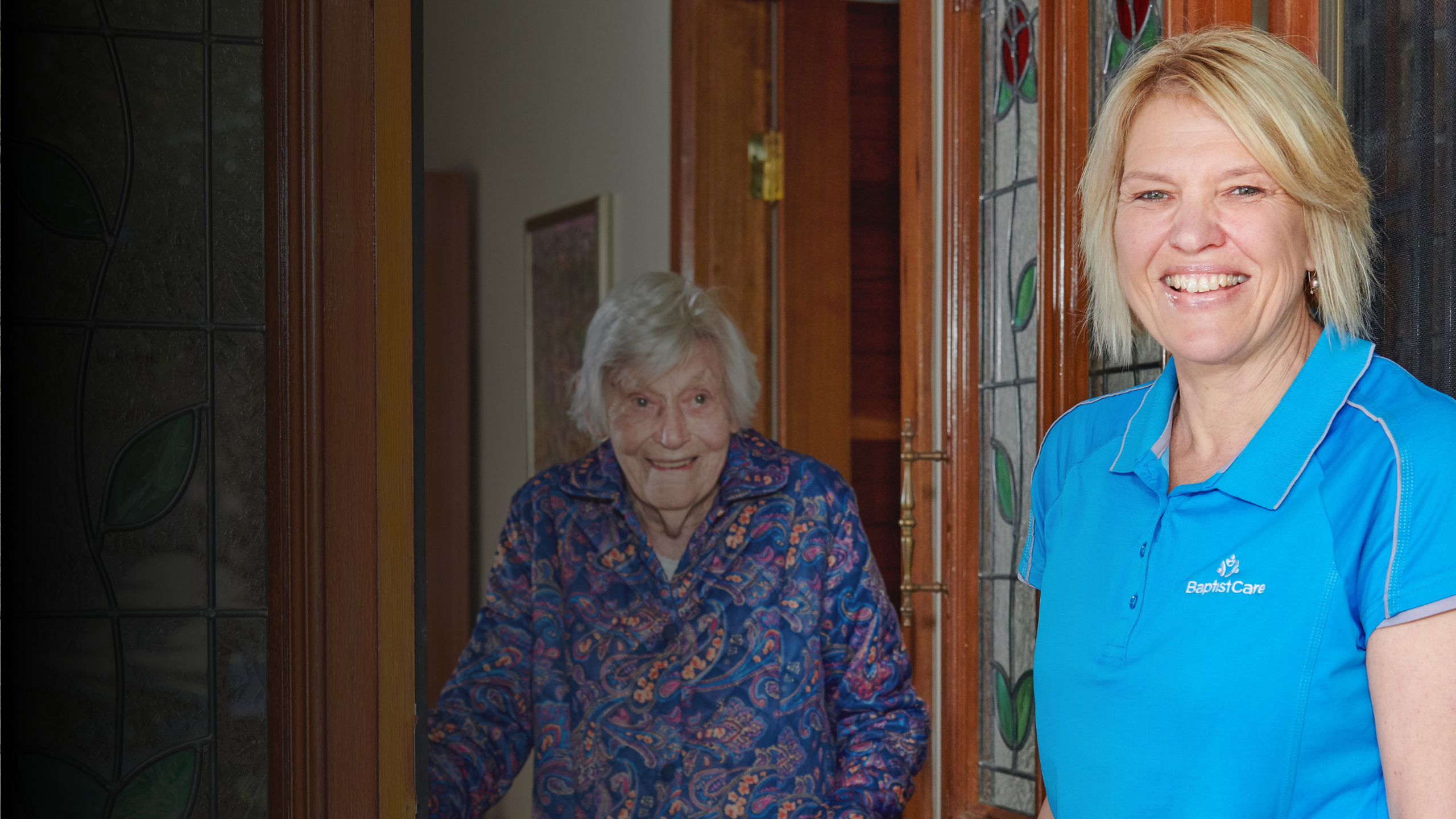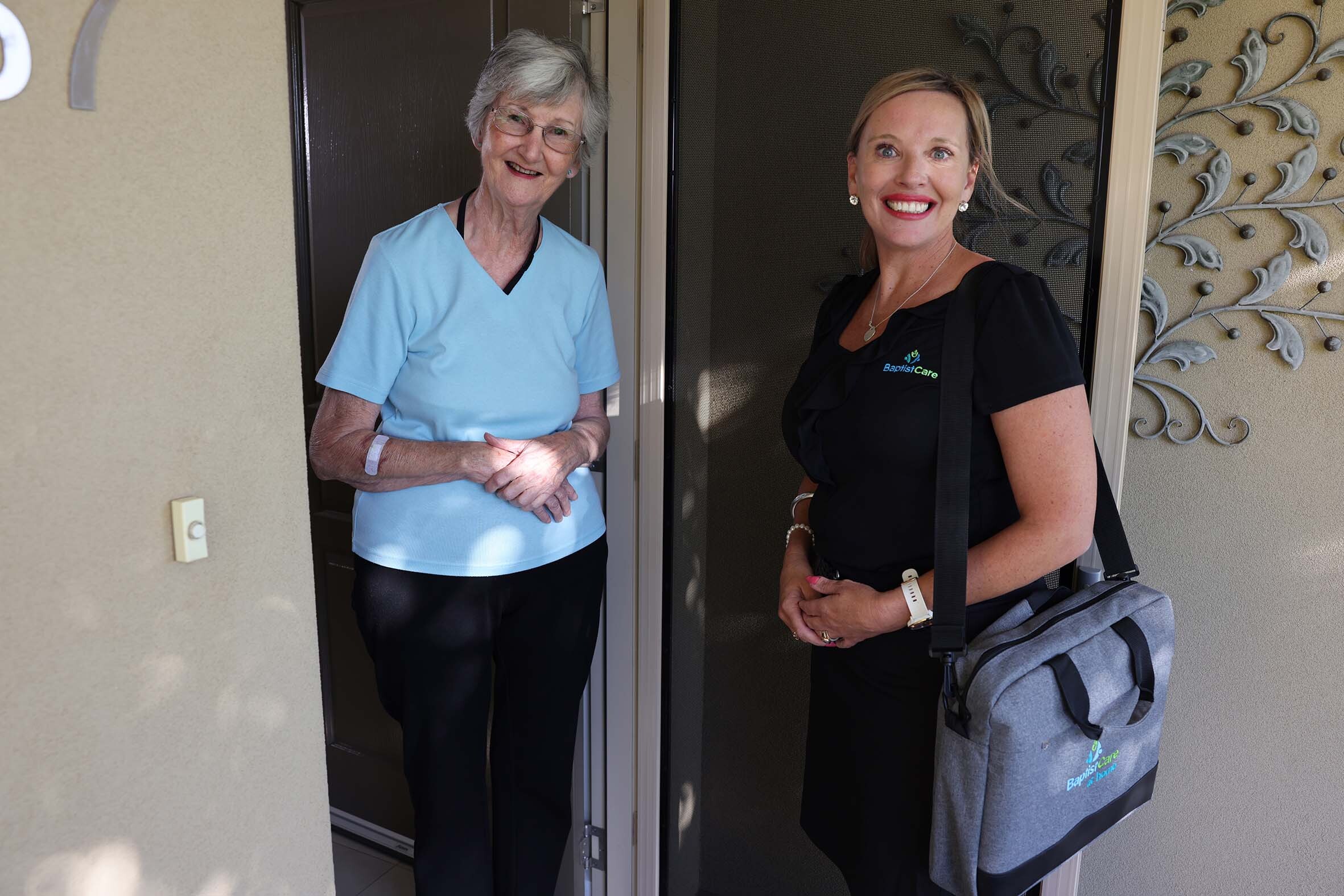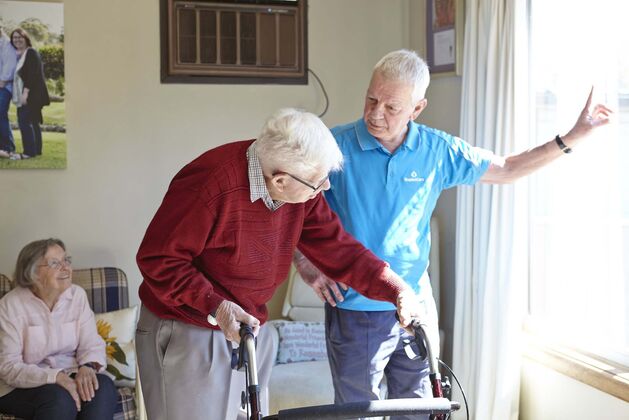What is the difference between Home Care Packages (HCP) and the Commonwealth Home Support Program (CHSP)?
There’s no shortage of similar-sounding acronyms when it comes to home care, and you may be trying to decipher the difference between CHSP and HCP. Our guide explains the key differences so you can decide which one is right for you.
Scroll to Explore

17 January 2024
Stories
| Home Care
Download this article as a PDF.
When it comes to in-home care and support for senior Australians, you've probably heard many different names and acronyms– ‘HCP’, ‘CHSP’, ‘My Age Care’, ‘ACATs’.
Trying to get your head around all the information can be tricky, and you may be wondering where to start.
In summary, the Home Care Package program (HCP) and Commonwealth Home Support Program (CHSP) are the two main avenues of government-funded home care services for seniors in Australia, and they are designed to meet different care needs.
Read on to find out which home care program might be right for you.
Key takeaways:
- Home Care Packages (HCPs) and the Commonwealth Home Support Program (CHSP) are two different government-funded services designed to help you live well at home
- The CHSP is an entry-level care service aimed at seniors requiring short-term or basic ongoing support
- The HCP is for those with more complex needs and is available in four different ‘levels’ of care.
Jump to:
What is the difference between CHSP and HCP?

In summary, the Australian Government subsidises the bulk of home care costs for older people via two different avenues:
1. The first is via the Commonwealth Home Support Program (CHSP). This is like an ‘entry-level’ into home care, aimed at people who only need minimal or temporary support with just a few basic services
2. The second is via the Home Care Packages program (HCP), which is more involved and has four different levels of care depending on your needs and requirements.
Unlike the CHSP, which offers a number of individual services – sometimes all delivered by different providers - the HCPs provide a coordinated approach to your care, preferably delivered by one organisation with a multidisciplinary team.
Both options have the same aim: to help you continue living independently in your own home for as long as possible.
Which one you receive will depend on your level of care requirements and whether you meet the eligibility criteria.
Read on to find out more.
CHSP vs HCP – key differences at a glance
The table below outlines the main differences between the CHSP and HCP programs in Australia.
| Best suited for: | What kind of services? | Assessment type | Wait times | |
| CHSP | Low-level needs: Seniors requiring short-term or basic ongoing help with just a few services. |
| Face-to-face assessment with the RAS (Regional Assessment Service). | Anywhere from one to six months, depending on which services you require.* |
| HCP | More complex needs: Seniors requiring a coordinated approach to care involving multiple disciplines. | All services included in CHSP plus dedicated care management to organise a broad suite of services, referrals for additional services and the purchase of other goods and services directly related to the client’s care needs | Face-to-face assessment with the ACAT team. | Anywhere from three to twelve, depending on your care needs and level of priority. |
*Some home care services, such as garden maintenance or home modifications, are often highly sought after and may have longer wait times.
It’s important to note that Home Care Package guidelines are flexible, and you may require other services that aren’t listed above. Your provider will work with you to establish a care plan that includes several coordinated services to suit your needs.
Our home care services at BaptistCare, for example, are designed to help you achieve your personal goals so that you can live your best possible life at home. Read about what we offer here.
What is the Commonwealth Home Support Program (CHSP)?
This ‘entry-level’ program into home care services provides assistance with specific, everyday tasks, such as:
- General help around the home
- Shopping
- Garden maintenance
- Social and Group activities
- Occupational Therapy and Physiotherapy
- Dementia support
- Home Modifications such as ramps and grab rails
- Respite care – in home, group and overnight.

A CHSP is also suitable for short-term nursing and personal care, for example, if you are recovering from an operation and need some extra support. It can also be used as an intermediary service for those waiting for Home Care Package funding.
BaptistCare is one of the largest providers of CHSP in NSW and the ACT, with considerable expertise across the available services. Learn how to apply for CHSP here.
What is a Home Care Package (HCP)?
A Home Care Package (HCP) is aimed at seniors with higher care needs than those in the CHSP, where support services are coordinated across several disciplines.

These might include some or all of the following:
- Support with showering and personal hygiene
- Nursing and medical care
- Podiatry, physiotherapy, occupational and other therapies
- Meals and food preparation
- Help with impairments or continence
- Cleaning, laundry, and other chores
- Home or garden maintenance
- Changes to the home, such as stair lifts or bathroom safety rails
- Transport to appointments
- Social outings
Home Care Packages are available in four different levels. Each equates to a different sum of money allocated to you as an annual budget, which goes towards care and services that help you live well at home.
Find out more about Home Care Package levels here.
How do I apply for the Commonwealth Home Support Program (CHSP) or a Home Care Package (HCP)?
To apply for the CHSP or HCP services, you will first need to check whether your care needs are classed as low-level or more complex. This will then determine whether you are best suited for the CHSP or HCPs.

To start:
- Check your eligibility via the My Aged Care eligibility checker or by calling My Aged Care on 1800 200 422.
This process takes around fifteen minutes and will involve answering some basic questions about your current situation and needs.
Depending on which program you are eligible for with My Aged Care, they will arrange have one of the following two assessments:
1. A CHSP assessment with a Regional Assessment Service (RAS) consultant.
If, after your initial call, your needs are deemed low-level, then you will have a face-to-face assessment in your home. The RAS consultant will determine what services you require and advise which providers are available in your area.
2. A comprehensive assessment with an Aged Care Assessment Team (ACAT)
If your care needs are more complex, then you will have a face-to-face assessment with a member of the ACAT. Your assessor will have clinical knowledge and a strong understanding of older persons’ care needs.
The ACAT assessment will last anywhere between one and three hours and will focus on some of the following themes:
- Your general lifestyle and wellbeing, along with any concerns you may have regarding your health
- The support you’re currently receiving from friends, family, or service providers and whether you’d like it to continue
- How you’re going with completing daily tasks and activities at home
- If you’ve noticed any recent changes to your memory
- How you feel about your personal safety, both at home and when you’re out and about
You can learn more about what’s involved in our comprehensive guide to ACAT assessments.
How do I choose a Home Care Provider?
Once you are deemed eligible for either the CHSP or a HCP and have completed your in-person assessment, your assessor will recommend local service providers.
They can write you a referral if you wish, and the provider will then contact you directly to organise services.
You may prefer to choose your own provider, and there are many reputable organisations to choose from, including BaptistCare at home.

In this case, you will be given a referral code, which you’ll give to your chosen provider so they can start organising services for you.
It’s important to know that you have 56 days to choose a government-approved care provider for your Home Care Package and provide them with this referral code.
Unfortunately, if you do not use your package in this time, it will expire, and you will need to reapply to go back on the national waiting list.
Get in touch with BaptistCare at Home
We are one of Australia’s largest and most trusted providers of home care and social clubs for seniors, delivering loving, respectful, and reliable care to more than 15,000 people across NSW, ACT, and WA.
If you would like to know more about BaptistCare’s home care services, our friendly team are here to help you.
Please call 1300 275 227 (Monday to Friday, from 8:00am to 6:00pm), email us at ask@baptistcare.org.au, or click the button below to complete a enquiry form, and one of our helpful team members will be in touch.